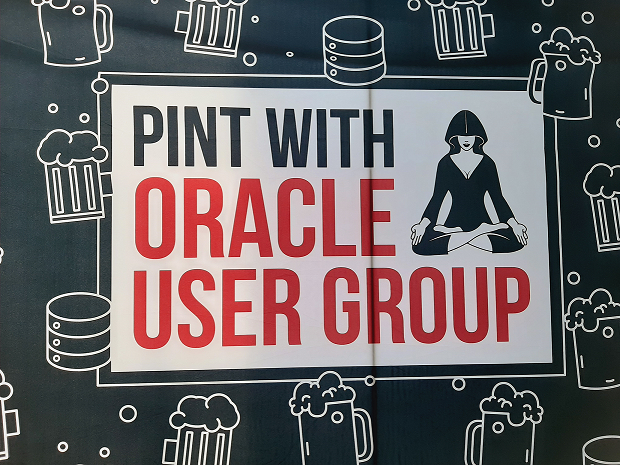
The Conference
POUG (Polish Oracle User Group or rather Pint with Oracle User Group) organizes as usual his annual conference in Poland in September to discuss about Oracle topics. The 7th edition of 2022 took place in Wrocław on September 9 and 10. Speakers arriving from all over the world presented technical sessions to Polish enthusiastic attendees. Two parallel tracks with almost 8 sessions per days each. At lunch time and at the end of day, the whole community stayed together to share good moments, food and drinks, games, laughs, to meet again friends from abroad… going on with some technical discussions.
POUG conference is definitely one of the best Oracle events in Europe!

My talk
This year I participated to the conference as a speaker with a topic about databases monitoring. So last Friday I talked about Percona Monitoring and Management tool (PMM) to monitor different technologies: not only MySQL and PostgreSQL servers in-the-box, but also how to integrate Oracle through external services. The idea was to give an overview of the tool, to explain how easy it is to install and turn on monitoring and show the nice features such as integrated alerting, Query ANalytics to get performance metrics over a period of time, Advisors checks to perform some security checks on databases, … (some of them in technical preview for the moment).

Great talks
Here a short list of some of the talks that I really enjoyed!
Zero Downtime Migration – A simple way of migrating Oracle databases to OCI, with Jakub Pitera
Zero Downtime Migration (ZDM) is the tool to migrate from on-premises or other clouds to Oracle OCI through several methods: physical offline migration (with RMAN), physical online migration (with RMAN + Data Guard), logical offline migration (with Data Pump), logical online migration (with Data Pump + GoldenGate). And in this last method, the downtime has just to be planned to switch the application! ZDM is easy to configure and use, comes with some nice options (pre-checks validation, dry-run). You can run several migrations in parallel, schedule them and add customized scripts. Last but not least, ZDM encrypt the target database for you.
Don’t lose your wheels on HA, with Daniele Bocciolini and Andrea Lauri
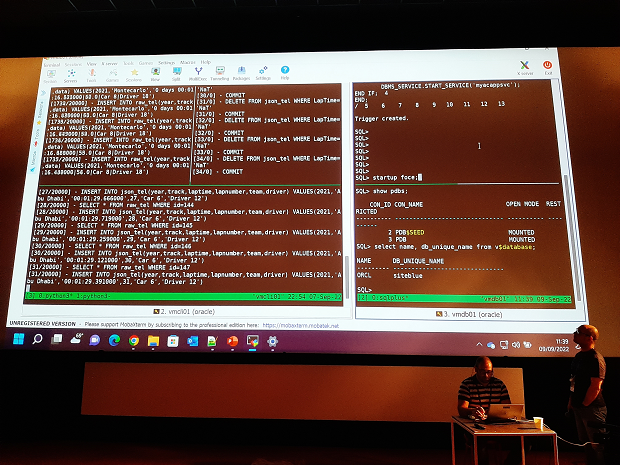
This talk was just amazing! A real exchange between a DBA and a developer with an impressive live demo to show the importance of High Availability and Oracle Transparent Application Continuity (TAC) using the following project specifications:
- Python3
- Poetry
- Click
- cx_Oracle
- 3 commands:
- ingest: to store telemetry data into a database
- cleanup: to read, sanitize and store cleaned data
- remove: to delete useless information.
From Exadata to Exacc, how screwed am I?, with Fernando Simon
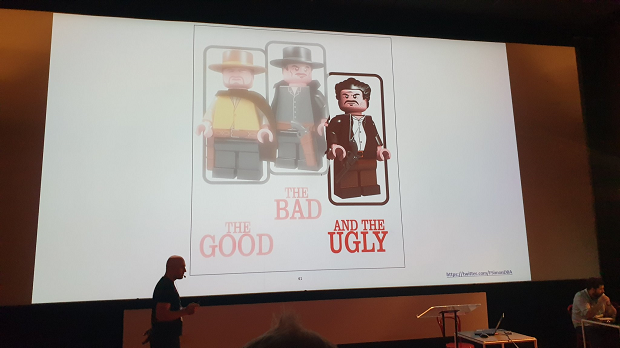
There are advantages to use an Oracle Exadata machine, but then you have to take care by yourself about hardware errors, patching, …
The “magic” solution is Oracle Exadata Cloud@Customer (ExaCC):
- You have an Exadata in your Data Center + OCI features
- You can enjoy automation and dedicated commands
- Patching is easy (pre-checks + apply).
With ExaCC you have to keep attention to:
- Have enough space to patch GI
- CPU during scaling
- Methods to create a database (dbaasapi is not fully documented, with REST API you cannot set important parameters such as PGA/SGA and charactser set, dbaascli asks a password all the time, …).
19c New Features are cool (also for attackers), with Rodrigo Jorge (Oracle PM on Migrations, Upgrades and Patching)
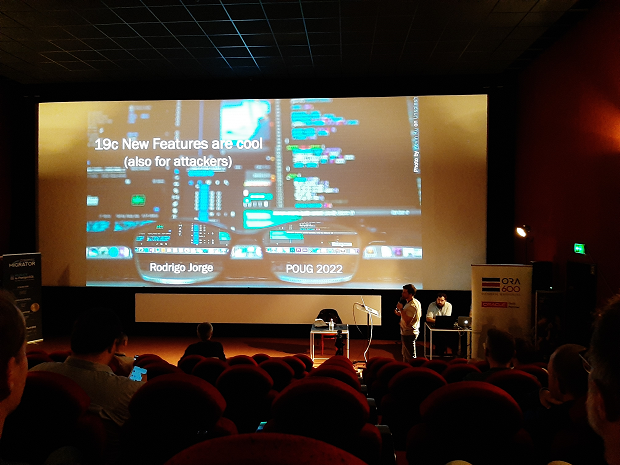
Security is really important, so it’s useful to know what people could do to attack your database and what you should do to avoid having these poorly designed systems.
Three main features were covered during the talk:
- Gradual Database Password Rollover for Applications
- Active Data Guard DML Redirection
- Oracle Blockchain Table.
And don’t forget the importance of following points:
- Patch your database and upgrade to 19c
- Protect also your standby database, not only your primary.
“Pour old wine in new bottles or “”Pour antique Oracle DBA skills in Ansible”””, with Flora Barriele
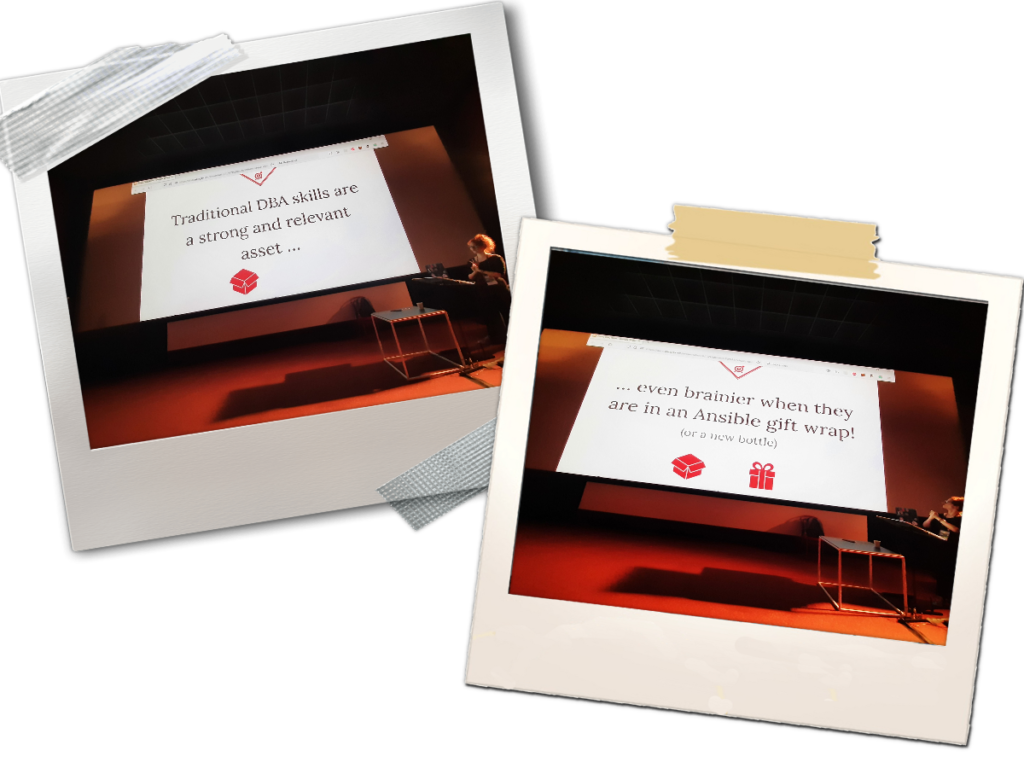
Ansible can be used to automate “boring” DBA tasks such as database creation, RMAN backups, … Here some key points:
- Ansible is agent-less!
- You can do lots of things with it, but maybe not everything from a DBA perspective.
- The idea it’s not to reinvent the wheel. Lots of modules has already been developed and you can use them.
- You have the possibility to add extra variables and overwrite them.
- You can skip tasks that you decided to tag in this way in your Yaml definition.
- It’s recommended to use Ansible Vault for passwords management.
- You can use web-based interfaces + REST API (AWX for instance) to have some add-values such as access control, job scheduling, …
by Elisa Usai
![Thumbnail [60x60]](https://www.dbi-services.com/blog/wp-content/uploads/2022/10/ELU_web-min-1-scaled.jpg)
![Thumbnail [90x90]](https://www.dbi-services.com/blog/wp-content/uploads/2022/10/STS_web-min-scaled.jpg)
![Thumbnail [90x90]](https://www.dbi-services.com/blog/wp-content/uploads/2022/08/STH_web-min-scaled.jpg)
![Thumbnail [90x90]](https://www.dbi-services.com/blog/wp-content/uploads/2022/09/SNA_web-min-scaled.jpg)